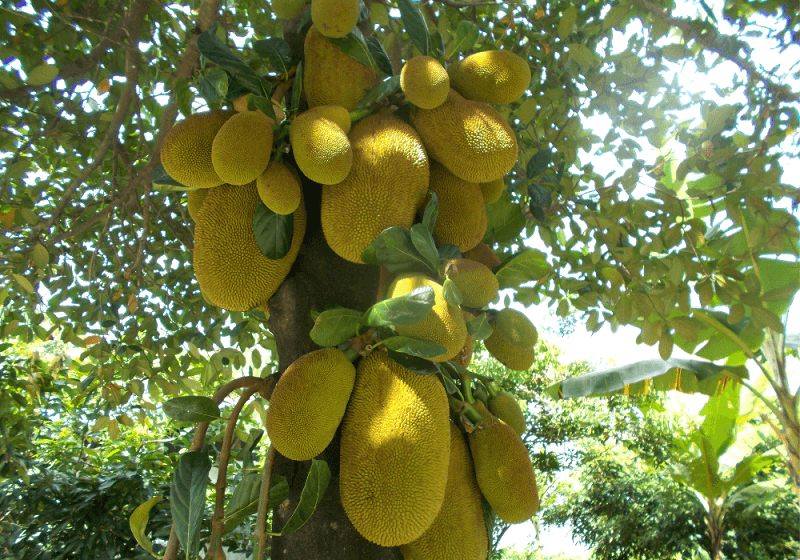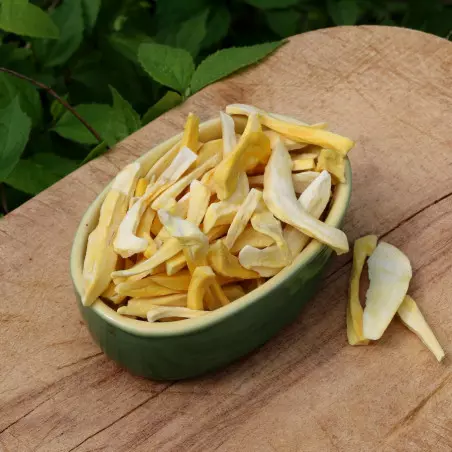The jackfruit is among the most fascinating fruits, surprising the world with its size! Yes, it is the largest fruit in the world that grows on trees. This fruit, with its scaly skin and yellow flesh, is a treasure of nature largely unknown despite its numerous health benefits. It is also known as the "poor man's fruit" because it can produce a large quantity of food with just one fruit due to its size. However, what truly sets it apart are its multiple nutritional and medicinal virtues. In this article, we will explore in detail the 7 benefits of jackfruit, demonstrating why it deserves its place in a healthy and balanced diet.
Where does jackfruit come from?
Also called "jack", jackfruit is native to the tropical regions of India. It is also cultivated in other parts of Asia such as Malaysia, Indonesia, the Philippines, Bangladesh, Thailand, and Sri Lanka, as well as in other regions of the globe like Africa, notably in Zanzibar and Uganda, or in South America like the Caribbean. This spread to different parts of the world was made possible by the jackfruit's ability to adapt to various hot and humid climates.
The jackfruit tree is an evergreen tree from the Moraceae family, it is so tall that it can reach up to 20 meters in height and it starts bearing fruit after 3 years of planting.
Is it really the largest fruit in the world?
The jackfruit is indeed the largest fruit in the world that grows on a tree. It can reach impressive dimensions, its weight can vary from 15 to 30 Kg or even more, depending on the variety of jackfruit, and measure up to a meter in length.
It is considered an important source of food in the regions where it is cultivated due to the amount of edible flesh it can provide. Indeed, jackfruits are rich in nutrients and can be consumed raw, cooked, or transformed into a variety of delicious dishes.
It should be noted that jackfruit is generally considered the largest fruit in the world, but if we include giant fruits that grow on the ground, like pumpkins, jackfruit is no longer the largest.

What are the nutritional values of jackfruit?
Jackfruit is a source of valuable nutrients that can contribute to a healthy and balanced diet. Here are the main nutrients it can provide for a 100-gram serving of edible flesh:
- Calories: about 95 kcal
- Carbohydrates: about 23 g
- Sugars: about 19 g
- Fiber: about 2.5 g
- Proteins: about 2 g
- Fats: about 0.5 g
- Saturated fats: negligible
- Monounsaturated fats: negligible
- Polyunsaturated fats: negligible
- Vitamin C: about 13 mg
- Vitamin A: about 49 µg
- Vitamin B6: about 0.1 mg
- Calcium: about 24 mg
- Iron: about 1 mg
- Magnesium: about 37 mg
- Potassium: about 448 mg
What are the benefits and virtues of jackfruit?
Here is a list of the virtues of this incredible fruit due to its nutritional composition and richness in essential nutrients:
- Facilitates digestion: Jackfruit is an excellent source of dietary fiber, making it a great ally for the digestive system. It helps prevent constipation, protects the colon, reduces the absorption of bad cholesterol, prevents stomach ulcers, and maintains a healthy gut flora.
- Vitamin and mineral supplements: Jackfruit provides essential vitamins for the proper functioning of the body. The vitamins present in this fruit include: vitamin C (boosts immunity), vitamin A (beneficial for visual health and skin), and vitamin B3 (important for proper metabolism and the production of certain hormones). It is also a source of minerals like potassium and magnesium, and trace elements such as iron, zinc, copper, and manganese.
- Fights hypertension: The potassium present in jackfruit can help regulate blood pressure by controlling sodium levels in the body. Potassium also contributes to the regulation of heart rates, which helps protect heart health and prevent hypertension.
- Hydration: Potassium (once again) combined with sodium allows the circulation of water between the inside and outside of cells, keeping you properly hydrated. Additionally, jackfruit contains a large amount of water, making it an ideal fruit for maintaining the body's water balance.
- Provides a rejuvenating effect: The antioxidants present in jackfruit can help slow down cellular aging, which helps maintain healthy, glowing, and youthful skin.
- Protects bone health: Thanks to the nutritional value of calcium present in this exotic fruit, it can help minimize the risk of osteoporosis. It is important to consume foods that contain calcium because our body does not produce it; jackfruit is an excellent way to benefit from it.
- Makes you feel energetic: If you're feeling down and don't feel like doing anything, jackfruit is ideal for boosting your energy. Its exotic touch will take you on a sensory journey. As a bonus, it also strengthens your immune system.
What does jackfruit taste like?
The taste of jackfruit can vary depending on its ripeness. This fruit has a distinctive tropical aroma, making it a beloved exotic fruit in cuisines around the world. When unripe, it can have a fairly neutral flavor, but generally, when it ripens, it has a sweet and slightly sugary taste, with subtle notes reminiscent of mango, pineapple, and banana. Its flesh becomes less juicy and firmer over time, unlike when it is consumed fresh, where the flesh is generally fibrous and juicy.
In cooking, jackfruit is often used in curries, sweet and savory dishes, desserts, and beverages. With its filamentous texture, it replaces meat in many saucy dishes, and the resemblance in appearance and taste is striking! Next to a chicken dish or shredded beef, it's impossible to tell which is which. It is increasingly seen in restaurants offering plant-based alternatives to classic dishes.

Are there any contraindications to eating jackfruit?
Jackfruit is not dangerous to human health, but there are some contraindications you should consider before eating this fruit:
- Let's start with allergies: some people may be allergic to jackfruit, which can cause reactions ranging from mild to severe. If you have never consumed jackfruit before, it is best to start with small amounts to check if you have an allergic reaction.
- Diabetic individuals should consume jackfruit in moderation because this fruit can have a hypoglycemic effect, potentially lowering blood sugar levels to a low point.
- It is true that jackfruit is rich in fiber, making it very good for digestion, but it can also cause gastrointestinal problems in some people sensitive to fiber, potentially leading to diarrhea, stomach aches, etc.
- Jackfruit can contain latex, a milky and sticky substance that is released when the fruit is cut or injured. This latex is often irritating to the skin and can cause allergic reactions in some sensitive individuals. These people may develop itching, redness, or skin irritations when handling fresh jackfruit due to the latex.
Our recipe with jackfruit
Here is a delicious recipe highlighting jackfruit:
Jackfruit Nice Cream
Ingredients:
- • Flesh of a fresh coconut (100g)
• 2 bananas, sliced and pre-frozen
• 1 handful of freeze-dried jackfruit (12g)
• 1 tsp of Espelette pepper
• 10cl of water (or plant-based milk)
Instructions:
- Blend everything in a blender until you achieve a perfectly smooth texture.
- Adjust the consistency with water or bananas according to your taste.
- Serve with whole freeze-dried jackfruit for dipping!
This frozen sorbet delights the taste buds with its comforting and spicy exotic side. Ideal for those looking to discover new tropical flavors. Enjoy!






